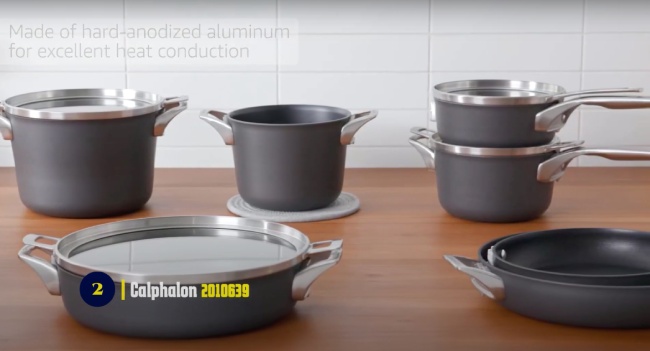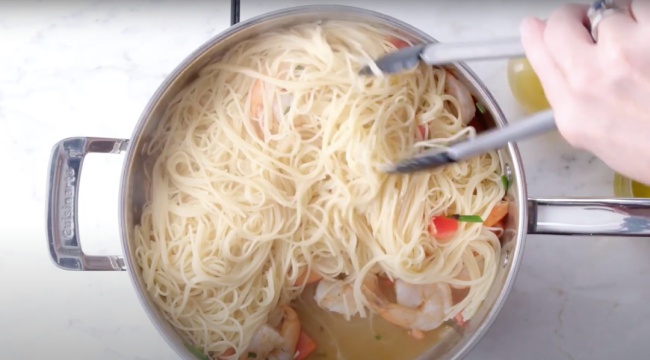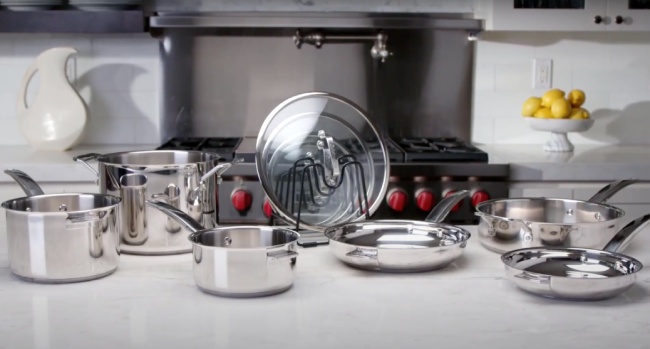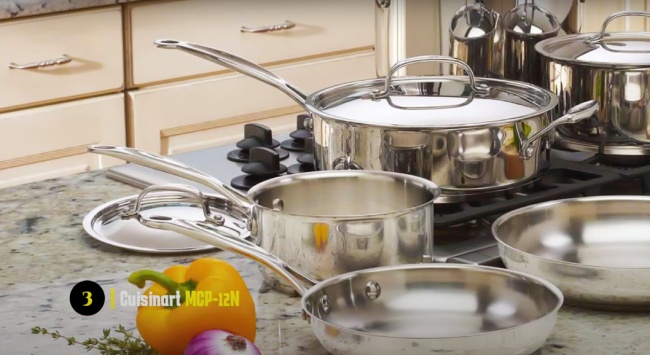Do I Need Special Cookware For Gas Range? You might be asking yourself this question, pondering the suitability of your current kitchen arsenal for your gas stove. Similar questions once occupied my thoughts, leading me to explore the vital role of selecting appropriate cookware.
In the open discussion, we delve into various cookware options well-suited to gas stoves, including stainless steel and cast iron, evaluating them based on their heat conductance, longevity, user-friendliness, and value for money. Stay tuned! An informed decision could significantly enhance your gastronomic adventures!
Best Types of Cookware for Gas Stoves
For gas stoves, the best types of cookware include stainless steel, hard-anodized aluminum, copper, cast iron, and carbon steel.
Stainless Steel
As an avid home cook, I use stainless steel for my gas stove. Besides their sleek, high-end look that adds a touch of professionalism to any kitchen, they offer superb performance. Stainless steel pans are about exceptional heat conductivity and durability, two critical factors for ideal cookware for gas stoves.
They’re often layered with copper or aluminum, enhancing their cooking prowess even further. Manufactured with three-ply metal encasing layers of copper and aluminum, this design results in rapid and even heat distribution across the surface.
These guys are versatile too! Fully-clad stainless steel is a worthy investment because it handles virtually all cooking methods, seamlessly browning meats, simmering sauces, you name it! And let’s remember about health-conscious cooks; we’ve got you covered! Stainless steel is one of the healthiest materials for cookware as there’s no chance of harmful chemicals leaching into our meals during cooking.
So go ahead and try out stainless steel pans on your gas stove. You might fall in love as I did!

Hard-Anodized Aluminum
In exploring the best types of cookware, we must recognize hard-anodized aluminum. This robust material is a star performer in any kitchen on gas stoves. Hard-anodized aluminum showcases an incredible ability to withstand intense heat, making it a reliable companion for culinary endeavors.
The strength of hard-anodized aluminum matches that of stainless steel due to its durability and scratch resistance. One brand offering this unique blend is All-Clad D5, with its groundbreaking steel core design for added toughness.
But why stop there? You will also encounter brands like Cuisinart Chef’s collection, praised for its even heating functionality, an essential feature when whipping up meals on gas stoves.
Moreover, these pots and pans are gas stove compatible and extend their versatility to induction cooktops and ovens, although they need to be more broiler suitable. Affordable options such as Rachel Ray’s line-up offer quality without breaking the bank!
In short, opting for hard-anodized aluminum delivers more than just cooking convenience; it ensures your food cooks evenly due to stellar heat distribution while promising long-lasting resilience in your kitchen arsenal against wear and tear.
So next time you find yourself shopping for new pots or pans, consider this outstanding player: hard-anodized aluminum.
Copper
Copper is a star performer in the realm of cookware for gas stoves. Its standout feature is its superb heat conduction property, ranking second to aluminum. No copper pan will do, though you want genuine copper cookware, not merely copper-colored aluminum versions.
Actual copper pans offer high-quality construction and thickness that resists warping on your gas range. Beyond aesthetics and durability, this cookware ensures an even heat distribution across your cooking surface.
This helps in perfectly searing steaks or simmering sauces without hot spots ruining your culinary masterpiece. However, like everything exquisite in life, top-tier performance comes with a premium price tag attached – authentic copper cookware tends to be more expensive than other options on the shelves.
Cast Iron
One of the best types of cookware for gas stoves is cast iron. Cast iron cookware is durable and retains heat exceptionally well, making it perfect for high-heat cooking on a gas stove.
The weight and thickness of cast iron help maintain a steady temperature, ensuring even cooking results every time. Additionally, cast iron pans can develop a naturally non-stick surface with proper seasoning and care over time.
This versatile material can be used for various cooking methods like frying, baking, and roasting. It’s no wonder that many professional chefs and home cooks prefer cast iron for its excellent heat retention and unique ability to enhance food flavors.
Carbon Steel
I love using carbon steel cookware on my gas stove. It is an incredibly versatile material with many benefits of cast iron without weight. It is durable and long-lasting and provides even heat distribution and retention, which is perfect for cooking on a gas stove.
Carbon steel has a high heat tolerance, making it ideal for high-temperature cooking techniques that elevate your dishes. Whether searing steaks or stir-frying vegetables, my carbon steel pans always deliver excellent results.
And the best part? They’re super easy to clean and maintain, making them a convenient choice on my gas stove for everyday use. No wonder professional chefs often recommend carbon steel cookware for gas stoves – it enhances your cooking experience!

Factors to Consider when Choosing Cookware for Gas Stoves
When choosing cookware for gas stoves, consider factors such as heat-conducting ability, durability, cladding options, comfortable handling, and cost.
Heat-Conducting Ability
Choosing cookware with good heat-conducting ability is crucial for gas stoves. This is because gas stoves generate high heat, and you want your cookware to distribute that heat evenly for optimal cooking results.
Materials like stainless steel, aluminum, copper, and cast iron are known for their excellent heat conductivity. They can quickly absorb the heat from the flame and transfer it evenly across the cookware’s surface, ensuring your food cooks evenly without hotspots.
So when selecting cookware for your gas stove, remember how well it conducts heat to ensure deliciously cooked meals every time.
Durability and Warp-Resistance
When choosing cookware for gas stoves, durability, and warp resistance are crucial factors. Gas stoves produce intense heat, which can cause pans to warp over time. To ensure your cookware withstands high temperatures, it is recommended to opt for thick and heavy-duty options like cast iron or fully-clad stainless steel.
These materials are less prone to warping and provide long-lasting performance in a gas stove setting. Selecting cookware with thicker bases will also help prevent warping as they distribute heat more evenly.
So be sure to choose durable and warp-resistant cookware that can handle the demands of your gas range efficiently.
Cladding (3-ply, 5-ply, or 7-ply)
Cladding in cookware refers to constructing multiple metal layers, such as stainless steel or aluminum, used in the base or throughout the entire pot or pan. The number of plies can vary, with options like 3-ply, 5-ply, or 7-ply cookware available.
Each layer serves a specific purpose, from heat distribution to strength and resistance to corrosion. Thicker cladding offers better heat retention and more even heat distribution across the cooking surface, which is especially important for gas stoves that produce intense direct heat.
Choosing between different ply options depends on personal preferences, cooking needs, and budget considerations.
Comfortable Handling
Comfortable handling is a crucial factor to consider when selecting cookware for gas stoves. Choosing pots and pans with handles designed for easy and safe maneuverability is essential.
Look for cookware with two handles or a long handle and a helper handle on the opposite side, as this allows for better balance and control while cooking. Investing in good quality oven mitts is also essential to protect against the high heat generated by gas stoves.
With comfortable handling, you can confidently whip up your favorite dishes without worrying about accidents or burns.
Cost
The cost is an essential factor when choosing cookware for a gas stove. While high-quality cookware can be an investment, it doesn’t necessarily mean you have to break the bank. Plenty of options are available at different price points that offer excellent performance and durability.
By setting a budget and researching, you can find cookware that meets your needs without compromising quality. Investing in durable and long-lasting cookware now may save you money in the long run by avoiding frequent replacements.

Benefits of Using Special Cookware for Gas Ranges
Using unique cookware designed for gas ranges offers several benefits. These include easier use and cleaning, better heat retention and distribution, and enhanced cooking performance.
Easier to Use and Clean
Using unique cookware designed for gas ranges makes cooking and cleaning a breeze. These types of cookware are specifically engineered to meet the demands of gas cooking, offering features that make them easier to handle and maintain.
For example, some cookware may have non-stick surfaces that prevent food from sticking, making cleanup a quick and straightforward task. Additionally, specialized cookware often has comfortable handles that provide a secure grip while stirring or moving pots and pans on the stovetop.
This means less kitchen hassle and more time to enjoy delicious meals cooked on your gas range.
Better Heat Retention and Distribution
Choosing unique cookware for a gas range can significantly enhance your cooking experience, thanks to its superior heat retention and distribution properties. Gas stoves distribute heat rapidly and evenly, making it crucial to have cookware that can keep up with high temperatures.
Opting for materials like stainless steel or aluminum ensures excellent heat retention, allowing your pots and pans to maintain a consistent temperature throughout the cooking process. This means you can achieve even browning on meats and vegetables while avoiding hot spots leading to unevenly cooked food.
With better heat distribution, you’ll also spend less time adjusting the flame or turning the pan, allowing you to focus more on creating delicious meals.
Enhanced Cooking Performance
Using unique cookware designed for gas ranges can significantly enhance your cooking performance. These specialized pots and pans are specifically engineered to maximize heat retention and distribution, resulting in more even cooking and better overall results.
The materials used in these cookware sets, such as stainless steel, copper, or cast iron, offer excellent heat conductivity, allowing for precise temperature control while preparing your favorite dishes on a gas stove.
Additionally, the durability of these cookware materials ensures that they can withstand high heat levels without warping or deteriorating over time. So whether you’re searing a steak or simmering a delicate sauce, investing in top-quality cookware designed for gas ranges will elevate your culinary experience.
FAQs about Do I Need Special Cookware For Gas Range?
Is it necessary to use unique cookware for a gas range?
Using unique cookware is not necessary for a gas range. However, certain types of cookware are better suited for gas stovetops due to their ability to distribute heat evenly and withstand high temperatures.
What type of cookware works best on a gas range?
Cookware made from cast iron, stainless steel, and copper is ideal for use on gas ranges because they have good heat conduction properties and can handle open flames without warping or melting.
Can I use non-stick cookware on a gas range?
Yes, you can use non-stick cookware on a gas range. However, it’s essential to choose high-quality non-stick pans specifically labeled as safe for use with high heat sources like gas burners to prevent damage or release of harmful chemicals.
Are there any safety considerations when using cookware on a gas range?
When using any cookware on a gas range, it’s vital to ensure the handles are secure and won’t easily tip over pots or pans. Additionally, always turn off the flame before removing or adjusting the cookware to avoid accidents or burns.
Conclusion on Do I Need Special Cookware For Gas Range?
In conclusion, while there is no specific need for unique cookware when using a gas range, choosing suitable materials can significantly enhance your cooking experience. Stainless steel, hard-anodized aluminum, and cast iron are top choices for their heat-conducting abilities and durability.
Investing in high-quality pots and pans with multiple layers of materials will ensure better heat distribution and retention, ultimately leading to improved cooking performance. So, while not essential, selecting the appropriate cookware for your gas stove can make a difference in your culinary endeavors.
Related post:

